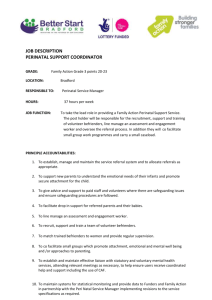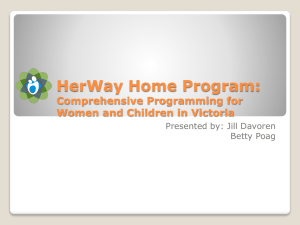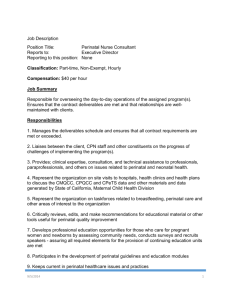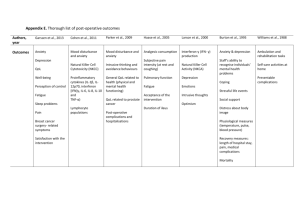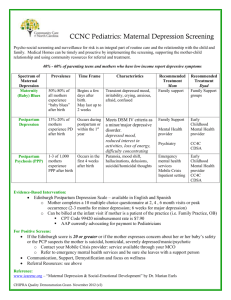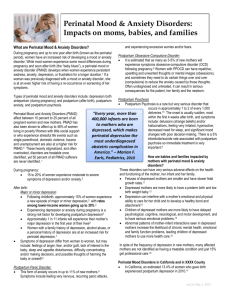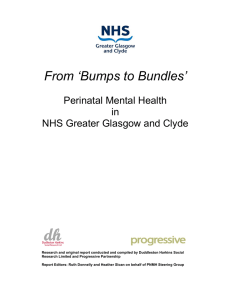Family Action Perinatal Support Project
advertisement
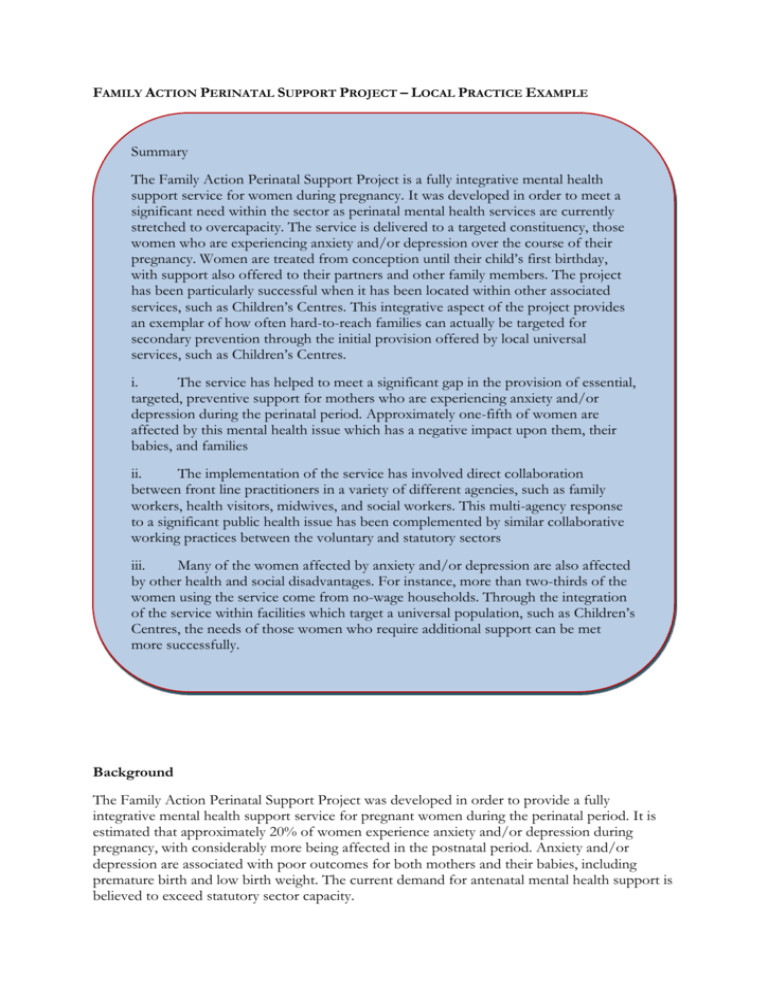
FAMILY ACTION PERINATAL SUPPORT PROJECT – LOCAL PRACTICE EXAMPLE Summary The Family Action Perinatal Support Project is a fully integrative mental health support service for women during pregnancy. It was developed in order to meet a significant need within the sector as perinatal mental health services are currently stretched to overcapacity. The service is delivered to a targeted constituency, those women who are experiencing anxiety and/or depression over the course of their pregnancy. Women are treated from conception until their child’s first birthday, with support also offered to their partners and other family members. The project has been particularly successful when it has been located within other associated services, such as Children’s Centres. This integrative aspect of the project provides an exemplar of how often hard-to-reach families can actually be targeted for secondary prevention through the initial provision offered by local universal services, such as Children’s Centres. i. The service has helped to meet a significant gap in the provision of essential, targeted, preventive support for mothers who are experiencing anxiety and/or depression during the perinatal period. Approximately one-fifth of women are affected by this mental health issue which has a negative impact upon them, their babies, and families ii. The implementation of the service has involved direct collaboration between front line practitioners in a variety of different agencies, such as family workers, health visitors, midwives, and social workers. This multi-agency response to a significant public health issue has been complemented by similar collaborative working practices between the voluntary and statutory sectors iii. Many of the women affected by anxiety and/or depression are also affected by other health and social disadvantages. For instance, more than two-thirds of the women using the service come from no-wage households. Through the integration of the service within facilities which target a universal population, such as Children’s Centres, the needs of those women who require additional support can be met more successfully. Background The Family Action Perinatal Support Project was developed in order to provide a fully integrative mental health support service for pregnant women during the perinatal period. It is estimated that approximately 20% of women experience anxiety and/or depression during pregnancy, with considerably more being affected in the postnatal period. Anxiety and/or depression are associated with poor outcomes for both mothers and their babies, including premature birth and low birth weight. The current demand for antenatal mental health support is believed to exceed statutory sector capacity. Model The service helps women throughout the course of their pregnancy and continues until their baby’s first birthday. It provides women who are experiencing mild to moderate anxiety and depression with emotional support from a team of volunteer befrienders who may themselves have experienced similar mental health issues. Support is also offered to women who are at risk of developing perinatal mental health issues in the future, as well as their partners and other family members. A number of key tasks are carried out under the aegis of the project: i. ii. iii. iv. v. vi. An initial assessment of need by a project coordinator The recruitment, training, and supervision of the volunteer befriender The maintenance of referral networks by the project coordinator The provision of home visits by a suitably trained volunteer befriender The establishment of groups that foster knowledge and understanding of a baby’s needs and support for the mother’s emotional wellbeing The development of informal support networks. Aims The project has a number of specific aims that it seeks to achieve: i. ii. iii. iv. Improve maternal mental health Improve attachment between mothers and their babies Reduce social isolation Improve the self-confidence of both mothers and volunteers. Results A randomised control trial was undertaken in 2009 by researchers from several London hospitals (Guy’s, King’s, and St. Thomas’). This reported that the project had halved the rate of maternal depression in participants. An evaluation was carried out by Professor Jane Barlow of Warwick Medical School. This resulted in a number of positive outcomes: i. ii. iii. iv. v. Significant improvements were made in anxiety and depression, social support, and mothers’ relationships with their babies in terms of warmth 88% of mothers had reduced anxiety scores 47% of mothers had a higher level of social support The mothers were unreservedly unanimous in praise of the service, with a number describing the project as ‘life changing’ A significant improvement was made in volunteer befrienders’ self-esteem, with a number identifying an increase in their own sense of empowerment and ability to manage their feelings. The data indicated that the project serves a specific demographic: more than two-thirds of women were from no-wage households, one third of which were single parent ones. Between 2% and 11% of the households also had child protection issues. Referrers were unanimous in their commendation of the project, asseverating that it filled a gap left by other services. Front line practitioners, including family workers, health visitors, midwives, and social workers, embraced the ethos and outcomes of the project. There were also strong indications of effective collaborative working between the voluntary and statutory sectors, as evidenced through information sharing and the conducting of joint assessments. The future Professor Barlow’s evaluation made a number of recommendations for the ongoing development of the project. This has resulted in several new adaptions being made: i. The piloting of antenatal group work focusing on wellbeing and self-help strategies ii. A National Perinatal Lead was appointed with the responsibility to ensure that the project’s work is both consistent and standardised iii. The Family Star Plus will be used as an assessment tool in order to incorporate the antenatal period (from April 2014). Integrative practice The service has been particularly successful when it has been located within other relevant local services, such as a Children’s Centre. It has been awarded The Centre for Excellence and Outcomes’ ‘Promising Practice’ when located within this facility, with OFSTED also rating the service as ‘outstanding’ under the category of ‘Care, Learning, and Guidance’. The Family Action Perinatal Support Project was seen as integral to this success and a recommendation was made to share this outstanding practice with other Children’s Centres. Volunteer befrienders The project provides volunteer befrienders with an employment pathway into nursing and social care. This has a concomitant impact upon the local community as it develops sustainable networks and skills which can only increase the potential capacity of the health sector. The project, which is now in its fourth year of operation, has recently seen mothers who were previously service users returning in order to volunteer once their children begin nursery and school. A significant number of volunteer befrienders have moved on to education, employment, or training. At one of the three sites at which the project is located the figure is 100%.
